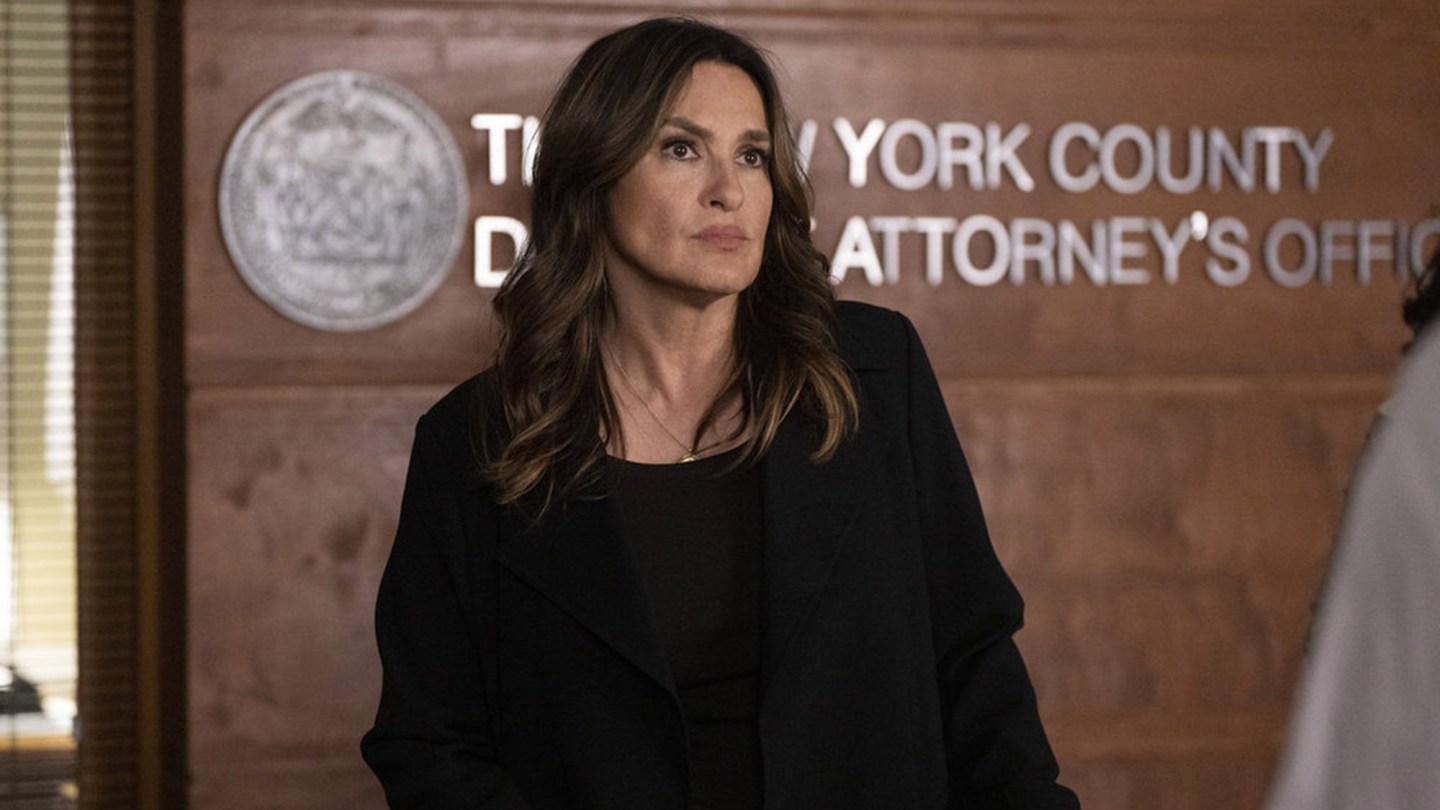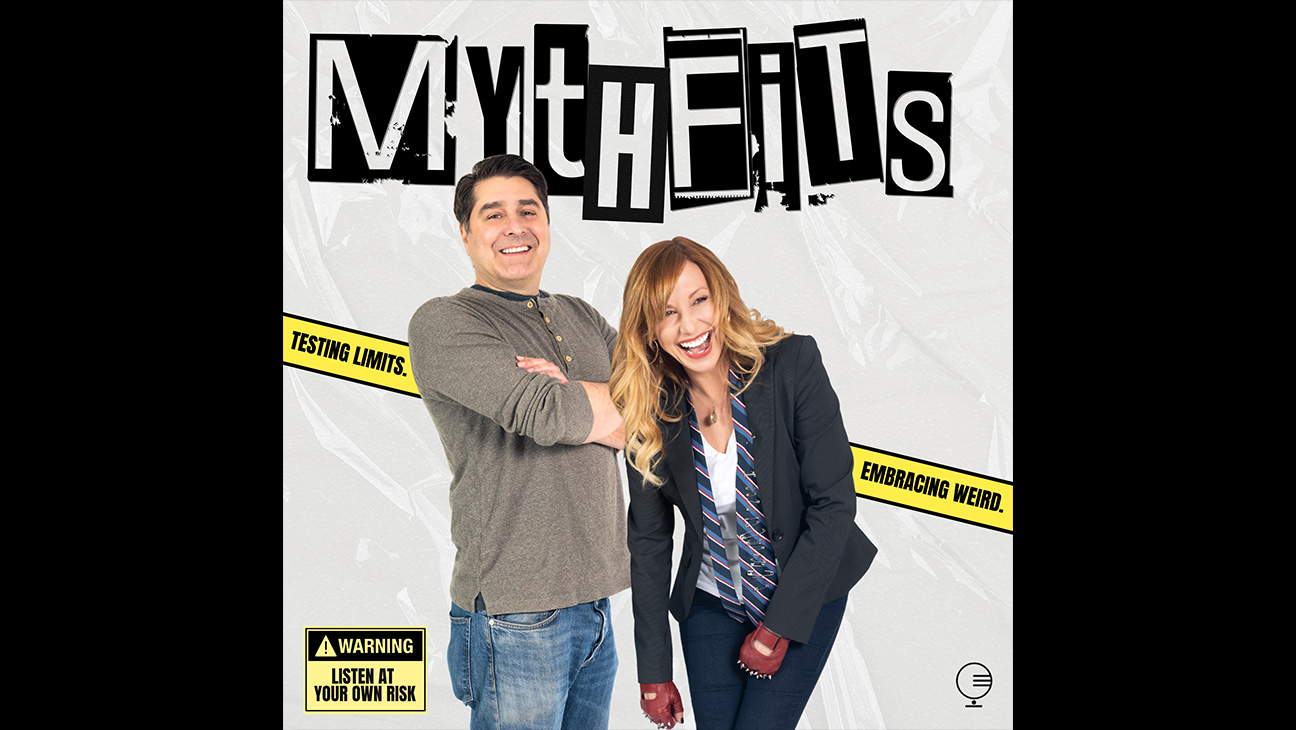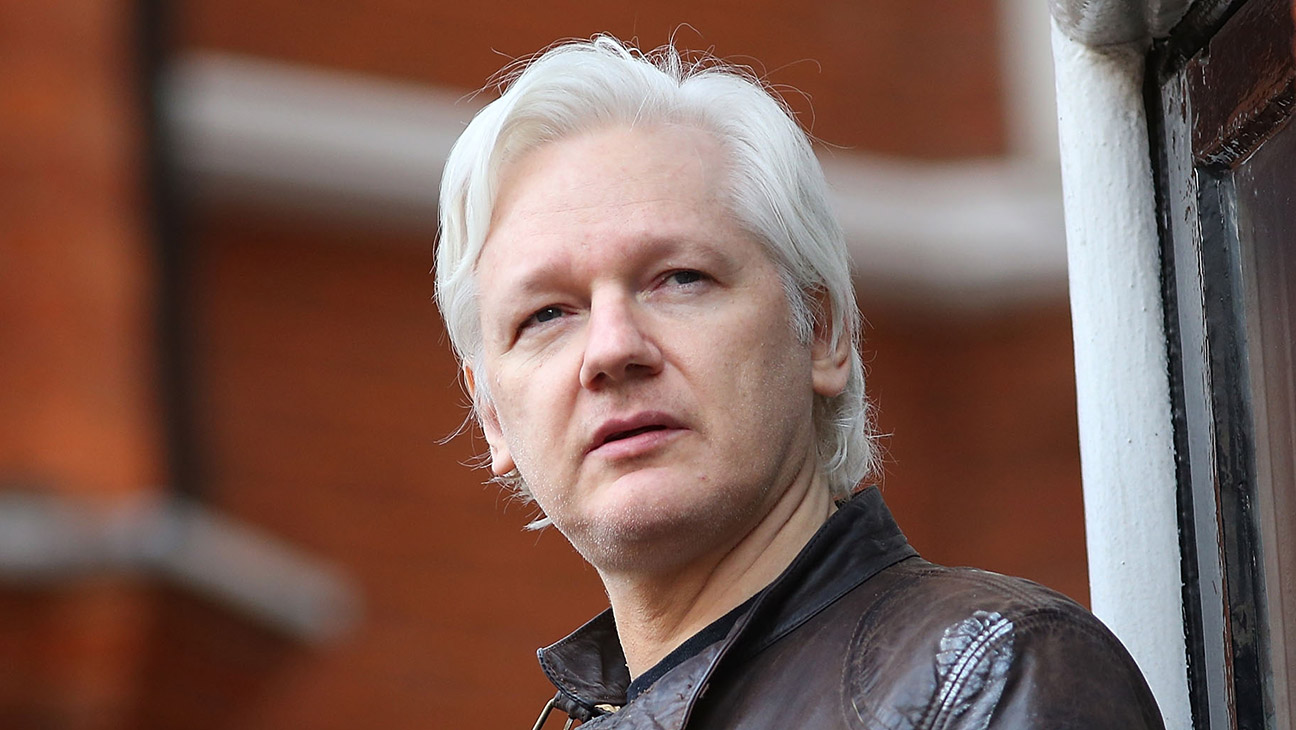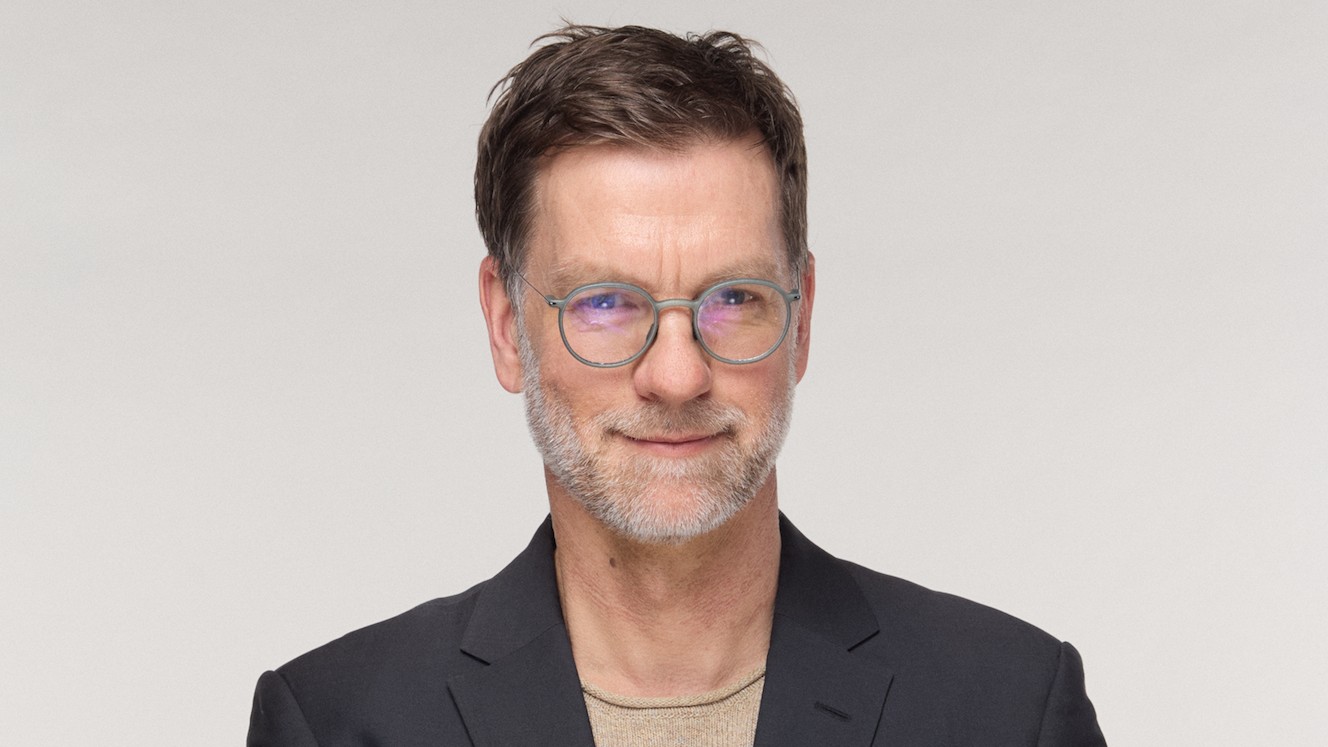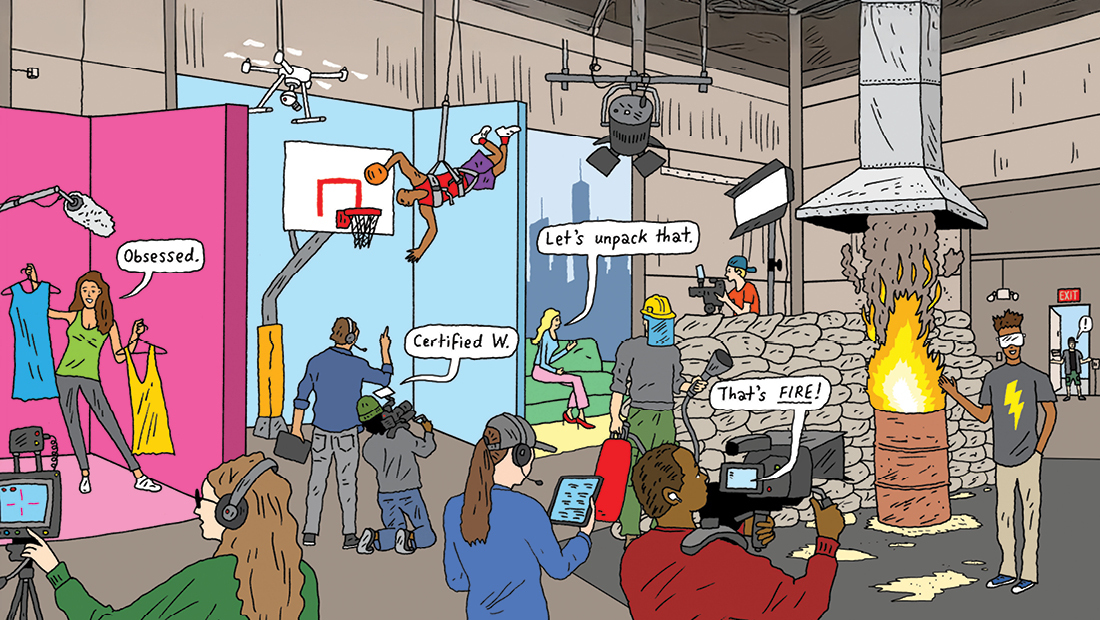
In the shadow of the Disney and Warner Bros. studio lots, a section of airplane fuselage has been repurposed inside of an industrial park near the Burbank airport.
The section of plane is now a film set, where the popular video creator Dhar Mann uses it to shoot original scripted fare, all embracing his philosophy of trying to “inspire, uplift, and bring a little more positivity into the world.”
On a brisk April afternoon in Burbank, Mann leads a small caravan of golf carts across his campus, which now totals three buildings and more than 100,000 square feet, with multiple sets for schools, restaurants, a shopping mall, a city street, a courthouse, jail and “rich” and “poor” homes. At any given moment some eight videos are shooting, keeping his staff of nearly 200 busy.
“In the early days, when we were shooting out of my apartment and we needed different film sets, my dining room was a restaurant, my bedroom was a patient room for a hospital, every single thing in my apartment was used for production sets,” Mann recalls, noting that his apartment furniture still furnishes some of the sets.
It’s a far cry from his current studio, which owns a fleet of cars (including multiple police cars), not to mention that section of airplane.
“These are real film-level sets. We use the same equipment, we have the same types of resources that the same production companies are doing on TV, well now you’re seeing that on YouTube,” he says, adding that his company produces content at what he estimates to be 1/100th the cost of a traditional production.

Dhar Mann in his Burbank studio
Dhar Mann Studios
A couple of miles away on a tucked-away Burbank street, a pastel-colored classroom has been transformed into a science lab. A producer instructs actors wearing white lab coats and safety goggles to react to something taking place offscreen (a giant “elephant toothpaste” experiment is involved). The scene is for an upcoming episode of Alan’s Universe, a scripted series developed by the popular YouTuber Alan Chikin Chow, who watches the takes intently from behind the camera operator.
Inside his studio building, Chow’s K-pop inspired color palette of pinks, purples and blues flow into every room and set, from a locker-filled hallway that mimics a high school, to bedrooms and bathrooms that — bright colors notwithstanding — would be familiar to any teenager.
“We used to make eight-minute videos. They were very vignette-y, they were not super story driven. I would not say that the earlier episodes are something that you could see on quote, unquote, real television,” says Chow, in a conference room (it also doubles as a conference room set) inside his building. “But now, because of this space, because of the cameras we have, because of the level of storytelling and the detail that we put in our writing, I can definitely say that what we’re making now is something that you could have seen as a Disney Channel Original Movie back in the day. There’s no difference, really. The level of quality storytelling, detail, world building, is all there.”
Chow and Mann are part of a new universe of professionalized creators springing up across Los Angeles and around the country, leveraging the reach of their social audiences and the monetization afforded by YouTube to build proper studio businesses. A new studio system being built next to the old one.
And Wall Street and Madison Avenue have taken notice. Both Chow and Mann say that there has been substantial investor interest in their respective businesses, affirming a trend across the sector: Sports creators Dude Perfect raised $100 million in an investment round last year, and MrBeast is seeking to raise $200 million at a $5 billion valuation for his business.
“All the friends that I have that are creators, they’re now buying houses, they’re getting married, they’re having kids. A lot of those folks are trying to think of, how can I still have a career? I built this amazing YouTube channel, but how could I have some sort of exit event, which allows me to live my life, buy my house, send my kid through college, but also allows me to not lose what I’ve built,” Mann says. “They want to make more money while still being in control of their business creatively, and not have some media company that has never run a YouTube channel take over and may not understand how digital content works.”

YouTuber Alan Chikin Chow’s set for Alan’s Universe.
Advertisers, meanwhile, are eagerly shifting their budgets toward creator content, acknowledging not only the improving quality of the work, but the relevance among younger consumers.
“I think everyone has come to recognize that our creators are truly next-gen media companies,” says Brian Albert, a senior YouTube’s sales executive. “They’re writers, they’re producers, they’re directors, all wrapped in one.”
On the west side of Manhattan in late March, as the sun set over the Hudson river, many of those top creators gathered at an advertising event hosted by the creator services firm Spotter. The YouTube personalities Colin & Samir hosted, noting how the landscape has changed under the entertainment business’ feet.
“YouTube CEO Neal Mohan said that creators are the startups of Hollywood, and today, a lot of these startups are starting to look more and more like studios,” said Samir Chaudry on stage, as marketers from companies like Uber and Shopify nodded along.
And increasingly, just as in traditional Hollywood, these studios are beginning to flourish outside of the Los Angeles metropolitan area.
By now it’s well known that MrBeast has turned Greenville North Carolina into a veritable company town, where his over-the-top unscripted concepts come to life; but in Birmingham Alabama, Kinigra Deon is building a scripted entertainment studio of her own.
“In 2021 I moved [from L.A.] back to Alabama, not to escape from Hollywood, but to build my own Hollywood,” Deon told attendees at the Spotter event.
And in the sprawling city of Frisco, Texas, just north of Dallas, the sports creators Dude Perfect have built an 80,000 square foot headquarters, including an indoor turf football field (with uprights), a massive basketball court (with motorized nets for elaborate trick shots), a gaming center, gym and offices (with a hidden slide behind a bookshelf to ensure easy access to the first floor). The dudes are also constructing a permanent set for their YouTube variety show Overtime.
During a recent visit to the facility, with YouTube executives, marketers and local officials exploring the space (many with their kids in tow), the Dudes used a device to blast giant smoke rings above attendees, and gave tours.
“I think people’s expectation of a YouTube channel can be very different when stepping into this building,” says Coby Cotton, one of the members of Dude Perfect, in a conference room located just steps from the basketball court and putting green.
Dude Perfect also owns the building next door, and the company plans to turn it into a production facility that can be used by other creators, with a virtual production set among the plans.
“This is part one, but that’s I think a huge component as well, where others will be able to film and produce content,” says Andrew Yaffe, Dude Perfect’s CEO.
Already, athletes like Tom Brady have come to the space to shoot content for their own social platforms or do a collab video, and Cotton says he expects that to ramp up.
“Because we’re in Dallas where every major athlete and celebrity comes through at some point in a given calendar year for a concert or competition, we hope that Dude Perfect will be a place that they will want to stop by just for fun, maybe bring their kids, shoot a piece of content, thinking of it the way they might already think about a late night show,” he says.

Dude Perfect’s soundstages in Frisco, Texas.
If the studios are a physical representation of how the creator economy has grown, the offices adjacent to those studios represent how it has matured. On the tour of his Burbank facility, Mann noted how many of his crew members joined from places like Disney and Lionsgate, and that his company’s CEO Sean Atkins was previously the president of MTV. At Dude Perfect, Yaffe joined from the NBA, where he led the league’s digital efforts as its EVP.
As traditional media tries to survive the tumult impacting its business models, creator studios are becoming in many ways the hot place for media veterans to land.
“We have a casting director who used to work for Nickelodeon, she was the casting director for The Thundermans,” Chow says. “And sometimes we get pushback from people who are not that open-minded. I always would think, what is the difference? Our casting director is from Nickelodeon, our show was shot with a similar budget to a Nickelodeon show, the build of the world and the scripts are just as good. I think it really comes down to people slowly starting to understand that this is the new era.”
Atkins, the CEO of Dhar Mann Studios, was one of those people, having left traditional media at MTV and Discovery to serve as the president of the creator-focused firm JellySmack before joining Mann’s company.
“It reminded me of the early days of cable, or the early days of unscripted, where someone has an operational and creative and price advantage, and they generally just move up the value chain over time,” Atkins says of the current moment. “I think the thing that makes these creators different is they were born in a world where they had to do everything. They just have a different mindset.”
Mann is a perfect example. He says that last year, he received an offer to sell his company, but turned it down, betting on himself, and the future of creator-driven content sparked by YouTube, which has paid more than $70 billion out to those uploading videos to its platform.
“Money was on the table,” Mann recalls. “I just realized, what would I rather do with my life? This is the most amazing career that I could ever dream of.”
This story first appeared in the May 7 issue of The Hollywood Reporter magazine. To receive the magazine, click here to subscribe.
#Hollywoods #Studio #System #Built #Creators

